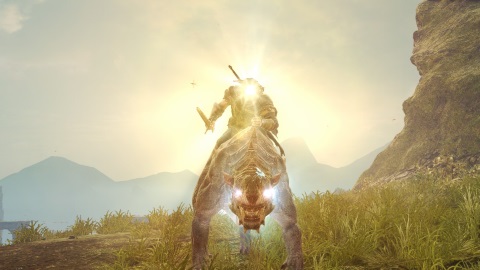Games of 2014
Last year I gave every game a rating on a 10 point scale, similarly to how many gaming sites do. But I tried an experiment: while most sites refuse to give games a rating lower than 7, resulting in most games bunching up between 7.0 and 8.5, I took 5/10 as the rating for an average game and meted out higher scores sparingly. Here’s a more detailed description:
I’ve started by treating an average game – that is, one that I enjoyed but didn’t stand out in any way – as a 5 out of 10. Good games would be 6s. Very good would be 7s. 9s would be rare and 10s would be reserved for only the greatest of experiences. Conversely, 4s would be games that were OK, 3s would be games I disliked, 2s would have major flaws, and 1s or zeroes would be virtually unplayable. Using this system, I came up with 6 games that seemed to fit in a list of “best of the year”, and I describe those games below. After discussing those 6 games I’ll post a list of all of the games I played in 2013 and how I would rate them. Assuming that I’ve been honest, the average should come out pretty close to 5 (possibly a bit higher since I tend to play games I know I’m more likely to enjoy).
The resulting average was 5.25, pretty close to my goal. I’ve rated all the games I played this year on a similar scale, though I’ve come out with a slightly higher 5.8 average. There were actually fewer good games this year, but I did a better job of steering clear of games I really disliked. This year there’s only one game below 5; last year I gave out two 1s.
Last year I wrote more detailed reviews for every game I gave a 7 or higher. This year that’s only four games, so I’m expanding my criteria a bit this year and giving brief reviews to everything that got a 6 or higher. In general it was kind of a disappointing year for games, with nothing beyond the top two or three really standing out. But first, I’m going to start with a brief talk about a game that missed the cut.
Dragon Age: Inquisition
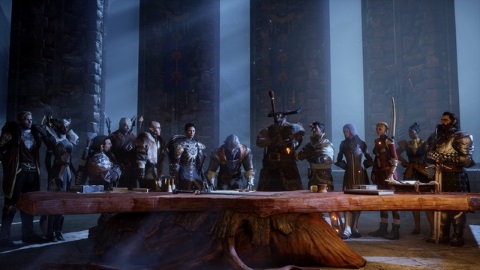
There are things about DA: I that I really enjoyed. The characters are up to Bioware’s usual quality, the dialogue is generally very good, and some of the central story missions are great. But I think my primary feeling about the game was summed up by Patrick Klepek – I Wish Dragon Age Respected My Time. Inquisition is a massive, but largely empty game filled with diversions held only thinly together. It suffers from the trend that afflicts most big-budget games these days, which is that it’s trying too hard to please too many different people, and it feels aimless as a result. Also, from a technical standpoint the PS3 version is a bug-riddled mess.
7. Elegy for a Dead World
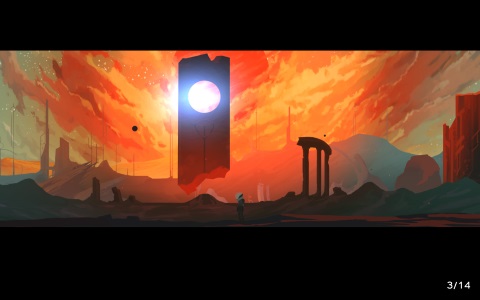
Elegy For A Dead World is probably what many people would call “not a game.” There isn’t really a set objective or ruleset. Instead, Elegy provides a sort of communal story-telling experience. Here’s how it works: there are three worlds, each based on a poem by one British poet. You play as a solitary astronaut whose crew has died and who has crash-landed on one of these planets. You walk across the landscape, and at specific points prompts come up that ask you to write some text about the scene in front of you. At the end of your journey, you’ve got a complete story, which is uploaded to a central server. Then you can read the stories that other people who’ve taken the same journey have written. A really unique experience with some achingly gorgeous water-colour backgrounds.
6. The Wolf Among Us

The first episode of this five episode series was so promising that it’s pretty disappointing this isn’t higher up my list. What starts out as an intriguing murder mystery quickly spirals out into a much larger conspiracy-driven drama that seems to lack focus. The biggest issue I had with TWAU was its shifting logic. For example, characters seem immortal most of the time, but in a very small number of specific instances they can die. It’s difficult to get emotionally involved in a story when you can’t know what the stakes are. Still, it is well put-together, and like Telltale’s other recent series, The Walking Dead, it provides a platform on which players can make more nuanced and mature decisions than most games offer.
5. Middle-Earth: Shadow of Mordor
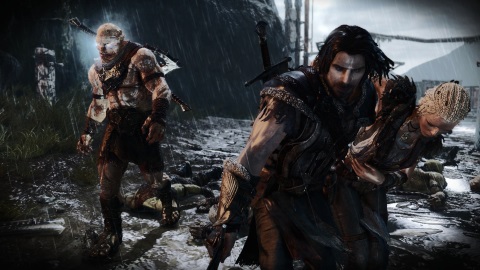
The image I chose to represent this game is a screenshot I took using Shadow of Mordor’s incredible in-game screen-capping tool. I also took this one:
And this one:
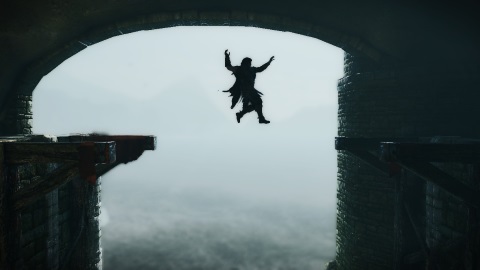 And a whole lot more. Sometimes I even took a break from framing screenshots to kill orcs, which I guess is also something the game lets you do.
And a whole lot more. Sometimes I even took a break from framing screenshots to kill orcs, which I guess is also something the game lets you do.
4. The Walking Dead: Season 2
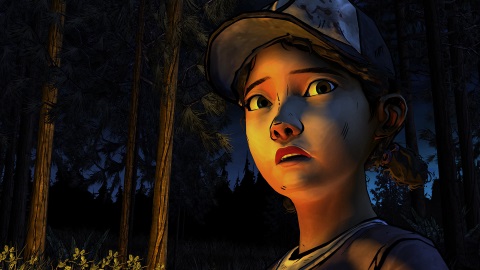
On the one hand, Season 2 felt like a big step back from Season 1, which was perhaps inevitible after some of the key creative people who worked on the first season left to go start their own studio. The plot points in the second season of TWD often felt more forced and predictable, and the retconning of the death of a character from the first season was awful. But, on the other hand, this is still a series that, as I said for The Wolf Among Us, offers more complex and nuanced decisions than almost any other game on the market, and Clementine (an 11 year old girl and one of the few survivors of the first game) is one of the more intriguing lead characters in gaming at the moment.
3. Bravely Default
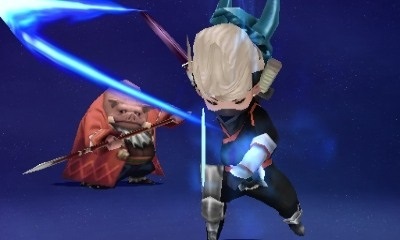
Oh Bravely Default, how I wanted to love you. A game that’s a throwback to SNES-era RPGs, especially Final Fantasy 5, this game could have been a new classic, and it wasn’t far off. The job system is a lot of fun, especially the way you learn new jobs by defeating bosses. That means that once you get past a boss fight, you get to use that characters abilities for yourself, which is very rewarding. The world design is great. There are also a lot of smart little touches, like the ability to turn off random battles. But there are things holding the game back, too. The story is not especially interesting, and story is usually one of the selling points of RPGs. And the fact that the game makes you replay huge sections multiple times after a false ending really is unforgivable.
2. Shadowrun: Dragonfall
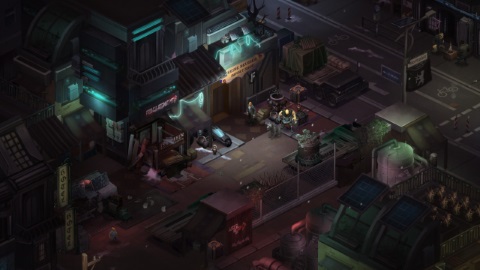
This may technically be considered an expansion to last year’s excellent Shadowrun Returns rather than a new game as such, but it’s sold as a stand-alone title and it’s a longer game than SR, so I’m counting it as a new title here. Dragonfall is a cyberpunk game about a crew of mercenaries who run espionage missions for corporate clients in order to earn enough money to uncover what happened to a former team-member who died under mysterious circumstances. The game uses a grid-based, turn-based RPG combat system, which endears me to it quite a bit. There are times where the combat drags on a bit too long, but on the whole this is a great game.
1. The Banner Saga

The Banner Saga was the first game I ever Kickstarted, as its gorgeous, Disney-style hand-drawn art drew me in, as did the promise of a mature story and tactical turn-based combat (are you sensing a theme?). The final result didn’t disappoint. The combat is great, challenging fun, and the story provides a lot of interesting decisions. The way the player is constantly asked to balance the needs of their military with the needs of their civilian followers is really emotionally engaging, and the decisions often felt heart-wrenching.
Unlike games like Dragon Age where the player is allowed to essentially control the destiny of a world, in The Banner Saga you’re face with far more complex decisions. For example, do I take the longer route, cutting down on the amount of combat to keep my fighters fresh, but potentially running out of supplies to keep the civilians from starving? One thing The Banner Saga does that most other RPGs refuse to do is allow you to make bad decisions; if the game hints that the people asking to join your caravan are bandits, they might really be bandits, and they might steal your food and run off with it. These much more nuanced and meaningful decisions make The Banner Saga stand out for me, and help propel it to #1 on this list.
Full list of game ratings (within-score numbering is random):
| The Banner Saga | 9 |
| Shadowrun: Dragonfall | 8 |
| The Walking Dead: Season 2 | 7 |
| Bravely Default | 7 |
| Elegy For A Dead World | 6 |
| The Wolf Among us | 6 |
| Shadow of Mordor | 6 |
| Thief 4 | 5 |
| Dragon Age: Inquisition | 5 |
| Little Big Planet 3 | 5 |
| Divinity: Original Sin | 5 |
| Endless Legend | 5 |
| Civilization: Beyond Earth | 5 |
| Hearthstone | 5 |
| Hack N Slash | 3 |
| 5.8 |

